BSBLDR501 Diploma: Developing and Using Emotional Intelligence
VerifiedAdded on 2023/06/15
|10
|2211
|197
Report
AI Summary
This report is an assignment solution focusing on the development and use of emotional intelligence within a leadership and management context. It includes a self-assessment of emotional strengths and weaknesses, identification of personal stressors in the workplace, and actions to improve emotional intelligence. Feedback from colleagues and family members is incorporated to provide a comprehensive view. The report also analyzes the impact of increased workload on a team, suggesting actions to manage emotional intelligence within the team, particularly addressing the needs of individual team members with varying experience levels. Finally, it outlines a meeting plan to promote positive emotional intelligence, including how managers can develop their own emotional intelligence and identify emotional issues within their staff. The document emphasizes the importance of emotional intelligence in leadership and management, highlighting strategies for self-improvement and team support. Desklib provides students with access to this assignment and a wide range of study tools.
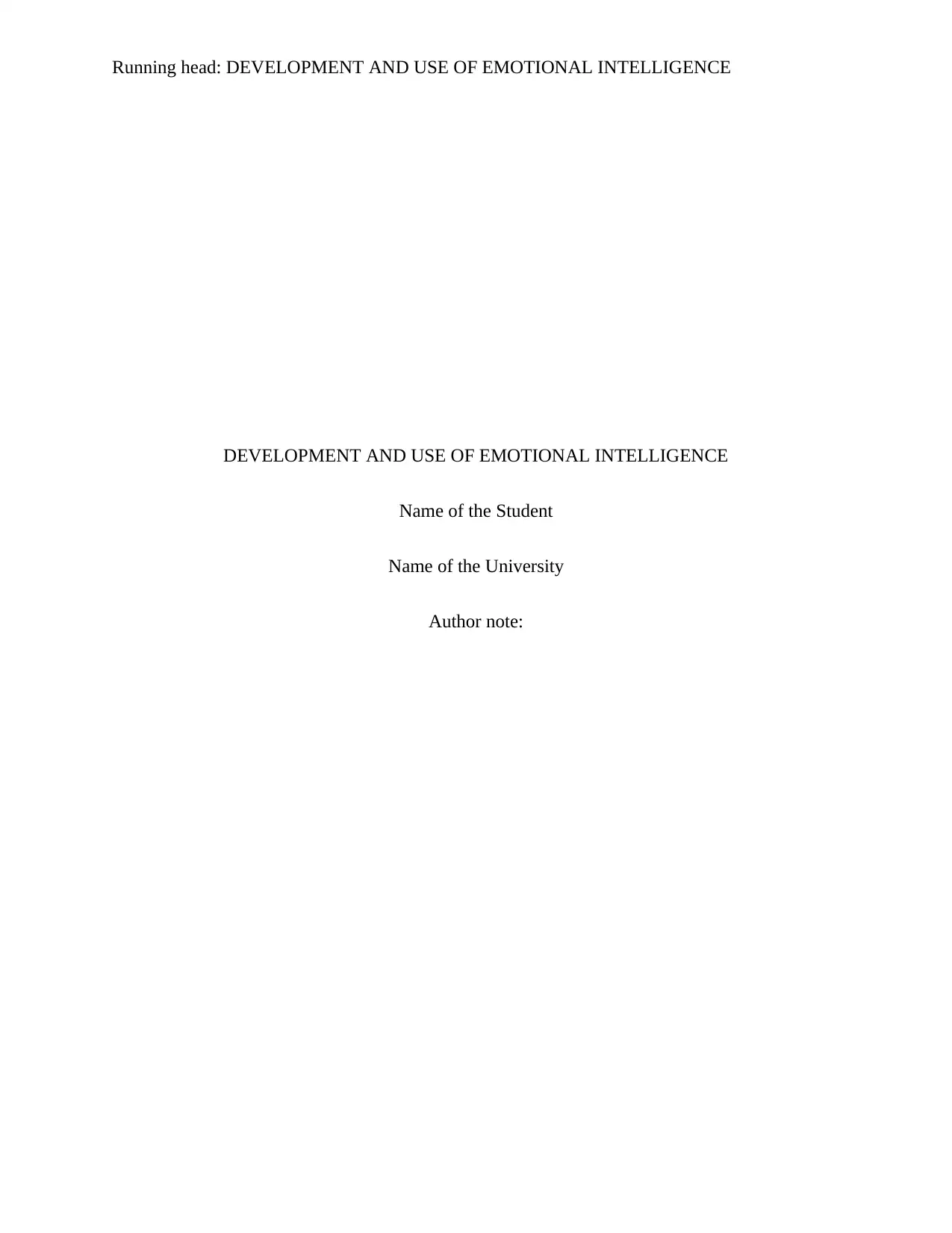
Running head: DEVELOPMENT AND USE OF EMOTIONAL INTELLIGENCE
DEVELOPMENT AND USE OF EMOTIONAL INTELLIGENCE
Name of the Student
Name of the University
Author note:
DEVELOPMENT AND USE OF EMOTIONAL INTELLIGENCE
Name of the Student
Name of the University
Author note:
Paraphrase This Document
Need a fresh take? Get an instant paraphrase of this document with our AI Paraphraser
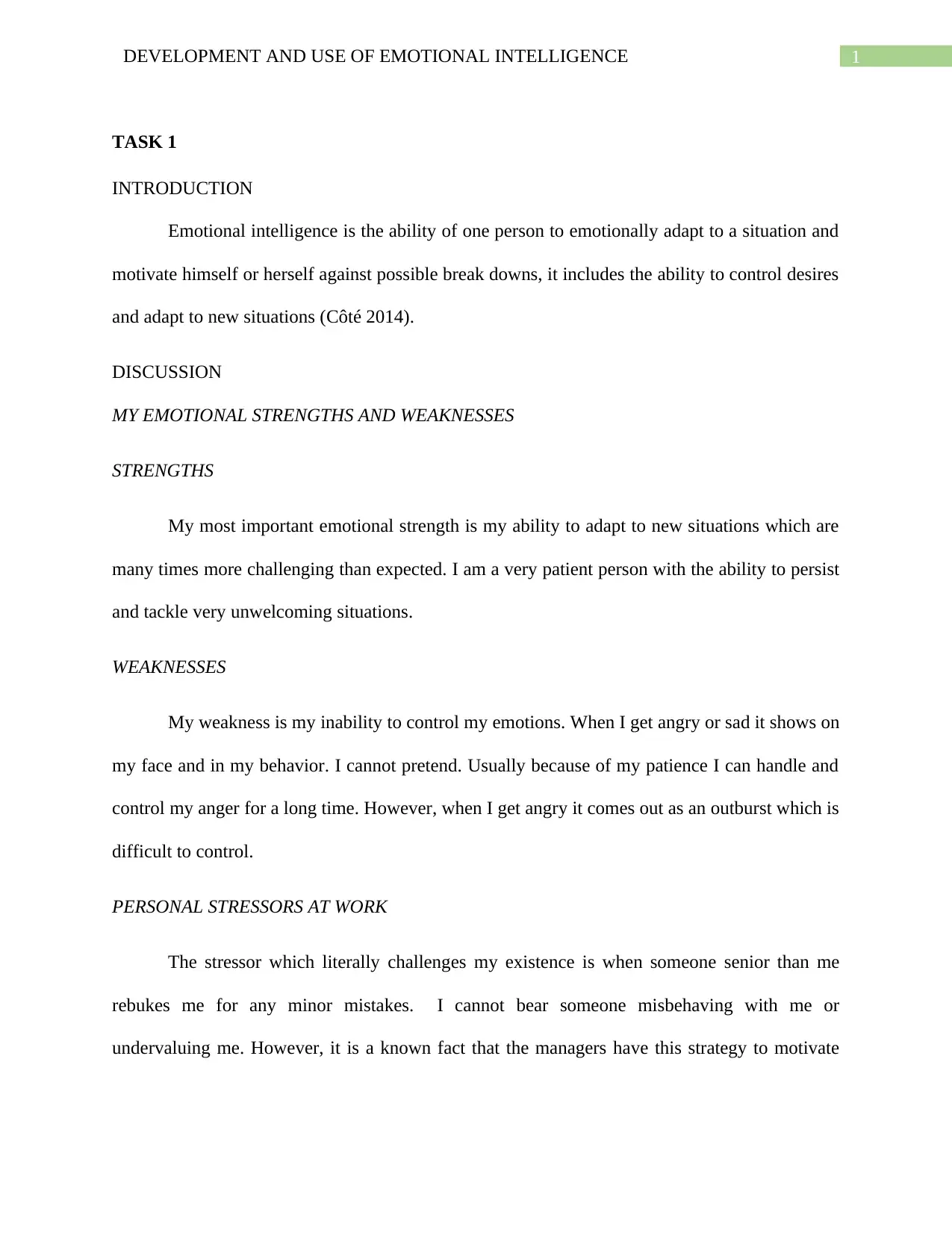
1DEVELOPMENT AND USE OF EMOTIONAL INTELLIGENCE
TASK 1
INTRODUCTION
Emotional intelligence is the ability of one person to emotionally adapt to a situation and
motivate himself or herself against possible break downs, it includes the ability to control desires
and adapt to new situations (Côté 2014).
DISCUSSION
MY EMOTIONAL STRENGTHS AND WEAKNESSES
STRENGTHS
My most important emotional strength is my ability to adapt to new situations which are
many times more challenging than expected. I am a very patient person with the ability to persist
and tackle very unwelcoming situations.
WEAKNESSES
My weakness is my inability to control my emotions. When I get angry or sad it shows on
my face and in my behavior. I cannot pretend. Usually because of my patience I can handle and
control my anger for a long time. However, when I get angry it comes out as an outburst which is
difficult to control.
PERSONAL STRESSORS AT WORK
The stressor which literally challenges my existence is when someone senior than me
rebukes me for any minor mistakes. I cannot bear someone misbehaving with me or
undervaluing me. However, it is a known fact that the managers have this strategy to motivate
TASK 1
INTRODUCTION
Emotional intelligence is the ability of one person to emotionally adapt to a situation and
motivate himself or herself against possible break downs, it includes the ability to control desires
and adapt to new situations (Côté 2014).
DISCUSSION
MY EMOTIONAL STRENGTHS AND WEAKNESSES
STRENGTHS
My most important emotional strength is my ability to adapt to new situations which are
many times more challenging than expected. I am a very patient person with the ability to persist
and tackle very unwelcoming situations.
WEAKNESSES
My weakness is my inability to control my emotions. When I get angry or sad it shows on
my face and in my behavior. I cannot pretend. Usually because of my patience I can handle and
control my anger for a long time. However, when I get angry it comes out as an outburst which is
difficult to control.
PERSONAL STRESSORS AT WORK
The stressor which literally challenges my existence is when someone senior than me
rebukes me for any minor mistakes. I cannot bear someone misbehaving with me or
undervaluing me. However, it is a known fact that the managers have this strategy to motivate
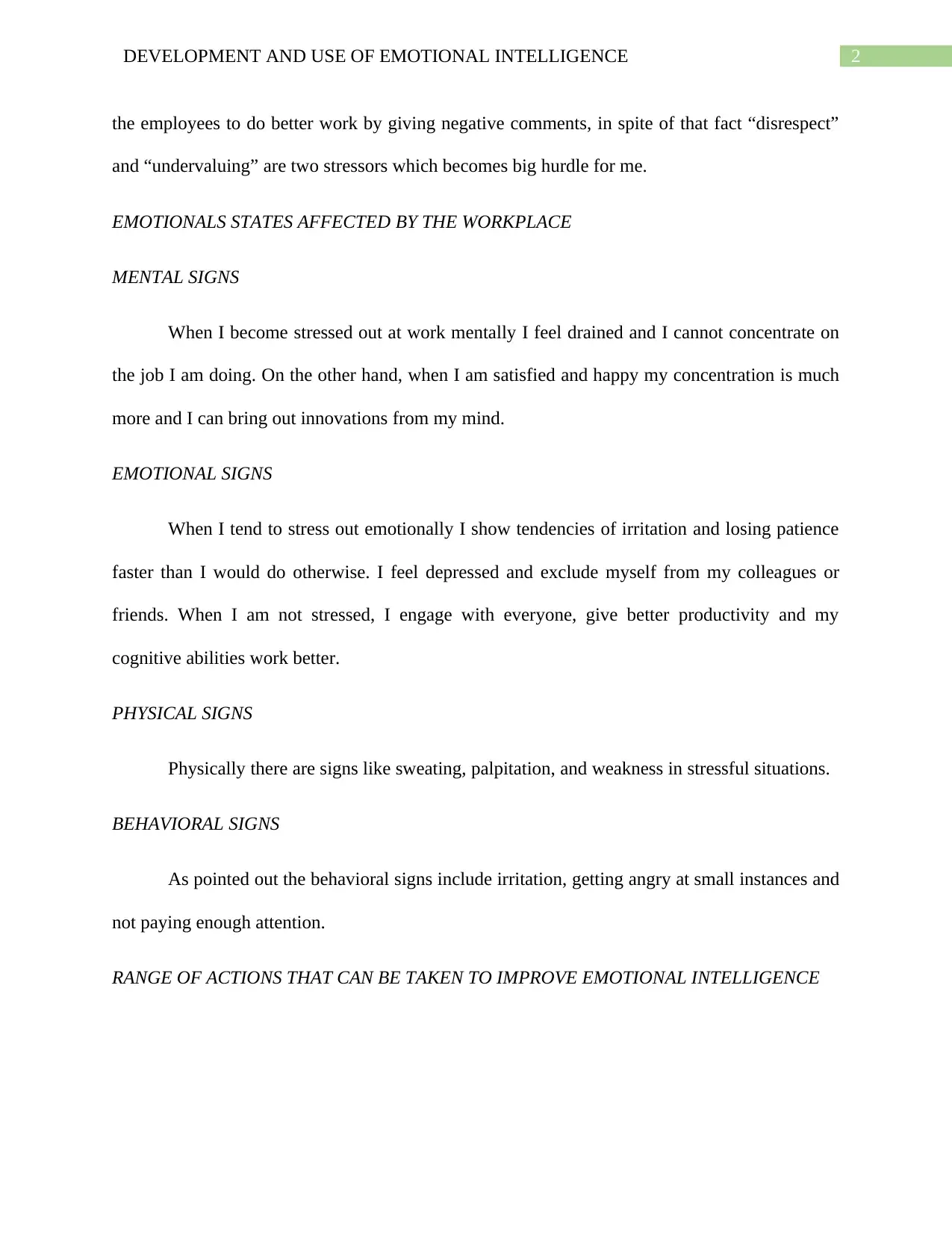
2DEVELOPMENT AND USE OF EMOTIONAL INTELLIGENCE
the employees to do better work by giving negative comments, in spite of that fact “disrespect”
and “undervaluing” are two stressors which becomes big hurdle for me.
EMOTIONALS STATES AFFECTED BY THE WORKPLACE
MENTAL SIGNS
When I become stressed out at work mentally I feel drained and I cannot concentrate on
the job I am doing. On the other hand, when I am satisfied and happy my concentration is much
more and I can bring out innovations from my mind.
EMOTIONAL SIGNS
When I tend to stress out emotionally I show tendencies of irritation and losing patience
faster than I would do otherwise. I feel depressed and exclude myself from my colleagues or
friends. When I am not stressed, I engage with everyone, give better productivity and my
cognitive abilities work better.
PHYSICAL SIGNS
Physically there are signs like sweating, palpitation, and weakness in stressful situations.
BEHAVIORAL SIGNS
As pointed out the behavioral signs include irritation, getting angry at small instances and
not paying enough attention.
RANGE OF ACTIONS THAT CAN BE TAKEN TO IMPROVE EMOTIONAL INTELLIGENCE
the employees to do better work by giving negative comments, in spite of that fact “disrespect”
and “undervaluing” are two stressors which becomes big hurdle for me.
EMOTIONALS STATES AFFECTED BY THE WORKPLACE
MENTAL SIGNS
When I become stressed out at work mentally I feel drained and I cannot concentrate on
the job I am doing. On the other hand, when I am satisfied and happy my concentration is much
more and I can bring out innovations from my mind.
EMOTIONAL SIGNS
When I tend to stress out emotionally I show tendencies of irritation and losing patience
faster than I would do otherwise. I feel depressed and exclude myself from my colleagues or
friends. When I am not stressed, I engage with everyone, give better productivity and my
cognitive abilities work better.
PHYSICAL SIGNS
Physically there are signs like sweating, palpitation, and weakness in stressful situations.
BEHAVIORAL SIGNS
As pointed out the behavioral signs include irritation, getting angry at small instances and
not paying enough attention.
RANGE OF ACTIONS THAT CAN BE TAKEN TO IMPROVE EMOTIONAL INTELLIGENCE
⊘ This is a preview!⊘
Do you want full access?
Subscribe today to unlock all pages.

Trusted by 1+ million students worldwide
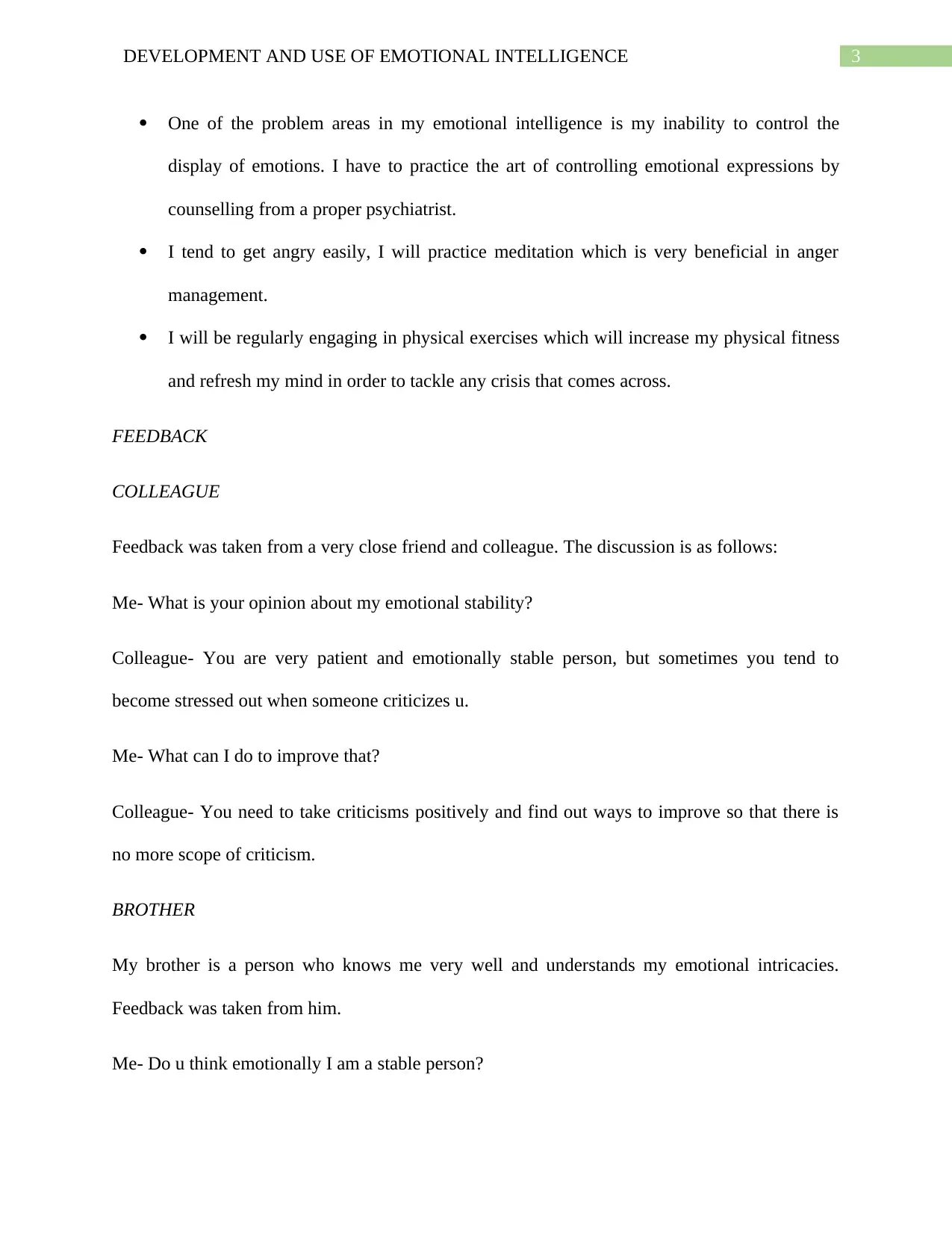
3DEVELOPMENT AND USE OF EMOTIONAL INTELLIGENCE
One of the problem areas in my emotional intelligence is my inability to control the
display of emotions. I have to practice the art of controlling emotional expressions by
counselling from a proper psychiatrist.
I tend to get angry easily, I will practice meditation which is very beneficial in anger
management.
I will be regularly engaging in physical exercises which will increase my physical fitness
and refresh my mind in order to tackle any crisis that comes across.
FEEDBACK
COLLEAGUE
Feedback was taken from a very close friend and colleague. The discussion is as follows:
Me- What is your opinion about my emotional stability?
Colleague- You are very patient and emotionally stable person, but sometimes you tend to
become stressed out when someone criticizes u.
Me- What can I do to improve that?
Colleague- You need to take criticisms positively and find out ways to improve so that there is
no more scope of criticism.
BROTHER
My brother is a person who knows me very well and understands my emotional intricacies.
Feedback was taken from him.
Me- Do u think emotionally I am a stable person?
One of the problem areas in my emotional intelligence is my inability to control the
display of emotions. I have to practice the art of controlling emotional expressions by
counselling from a proper psychiatrist.
I tend to get angry easily, I will practice meditation which is very beneficial in anger
management.
I will be regularly engaging in physical exercises which will increase my physical fitness
and refresh my mind in order to tackle any crisis that comes across.
FEEDBACK
COLLEAGUE
Feedback was taken from a very close friend and colleague. The discussion is as follows:
Me- What is your opinion about my emotional stability?
Colleague- You are very patient and emotionally stable person, but sometimes you tend to
become stressed out when someone criticizes u.
Me- What can I do to improve that?
Colleague- You need to take criticisms positively and find out ways to improve so that there is
no more scope of criticism.
BROTHER
My brother is a person who knows me very well and understands my emotional intricacies.
Feedback was taken from him.
Me- Do u think emotionally I am a stable person?
Paraphrase This Document
Need a fresh take? Get an instant paraphrase of this document with our AI Paraphraser
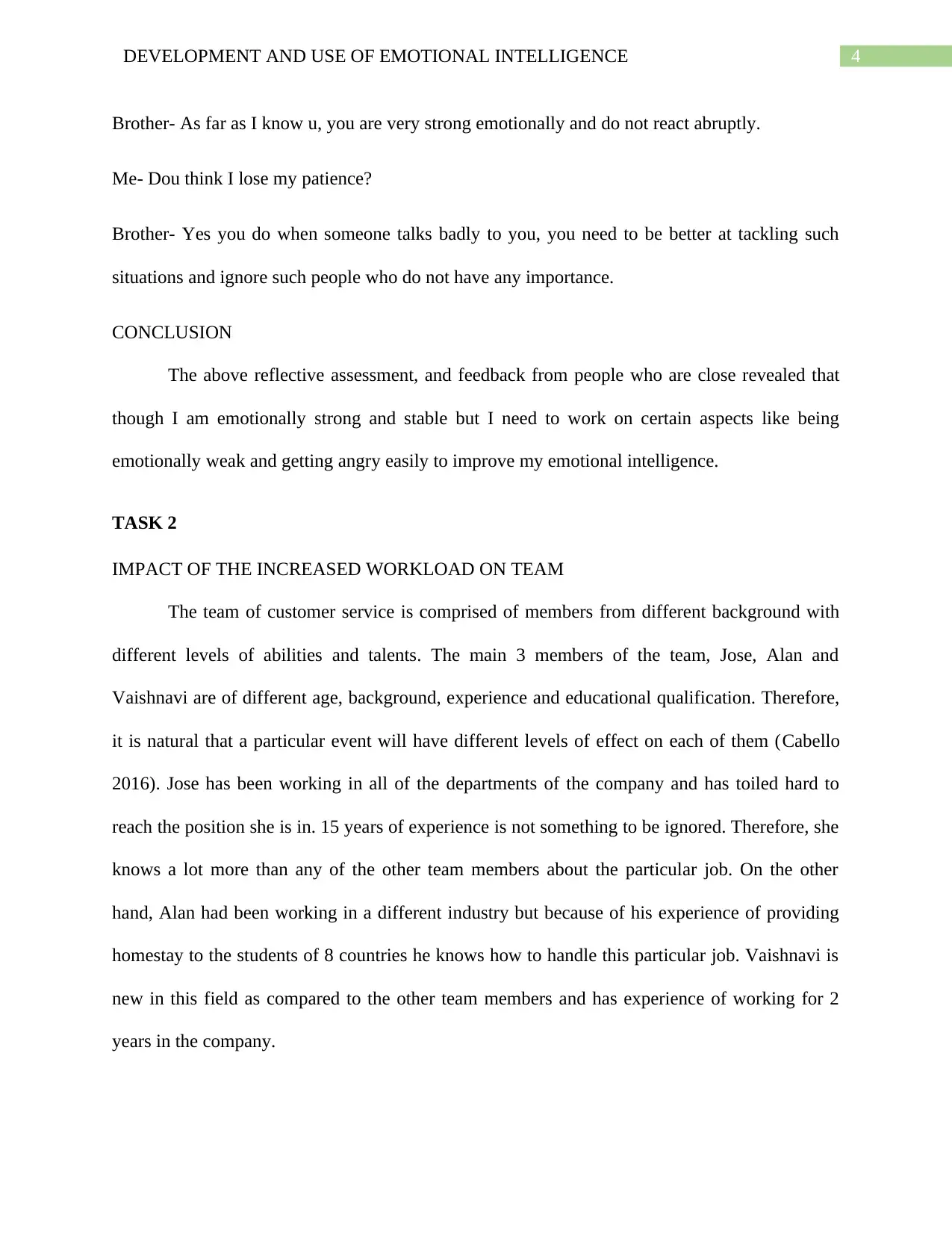
4DEVELOPMENT AND USE OF EMOTIONAL INTELLIGENCE
Brother- As far as I know u, you are very strong emotionally and do not react abruptly.
Me- Dou think I lose my patience?
Brother- Yes you do when someone talks badly to you, you need to be better at tackling such
situations and ignore such people who do not have any importance.
CONCLUSION
The above reflective assessment, and feedback from people who are close revealed that
though I am emotionally strong and stable but I need to work on certain aspects like being
emotionally weak and getting angry easily to improve my emotional intelligence.
TASK 2
IMPACT OF THE INCREASED WORKLOAD ON TEAM
The team of customer service is comprised of members from different background with
different levels of abilities and talents. The main 3 members of the team, Jose, Alan and
Vaishnavi are of different age, background, experience and educational qualification. Therefore,
it is natural that a particular event will have different levels of effect on each of them (Cabello
2016). Jose has been working in all of the departments of the company and has toiled hard to
reach the position she is in. 15 years of experience is not something to be ignored. Therefore, she
knows a lot more than any of the other team members about the particular job. On the other
hand, Alan had been working in a different industry but because of his experience of providing
homestay to the students of 8 countries he knows how to handle this particular job. Vaishnavi is
new in this field as compared to the other team members and has experience of working for 2
years in the company.
Brother- As far as I know u, you are very strong emotionally and do not react abruptly.
Me- Dou think I lose my patience?
Brother- Yes you do when someone talks badly to you, you need to be better at tackling such
situations and ignore such people who do not have any importance.
CONCLUSION
The above reflective assessment, and feedback from people who are close revealed that
though I am emotionally strong and stable but I need to work on certain aspects like being
emotionally weak and getting angry easily to improve my emotional intelligence.
TASK 2
IMPACT OF THE INCREASED WORKLOAD ON TEAM
The team of customer service is comprised of members from different background with
different levels of abilities and talents. The main 3 members of the team, Jose, Alan and
Vaishnavi are of different age, background, experience and educational qualification. Therefore,
it is natural that a particular event will have different levels of effect on each of them (Cabello
2016). Jose has been working in all of the departments of the company and has toiled hard to
reach the position she is in. 15 years of experience is not something to be ignored. Therefore, she
knows a lot more than any of the other team members about the particular job. On the other
hand, Alan had been working in a different industry but because of his experience of providing
homestay to the students of 8 countries he knows how to handle this particular job. Vaishnavi is
new in this field as compared to the other team members and has experience of working for 2
years in the company.
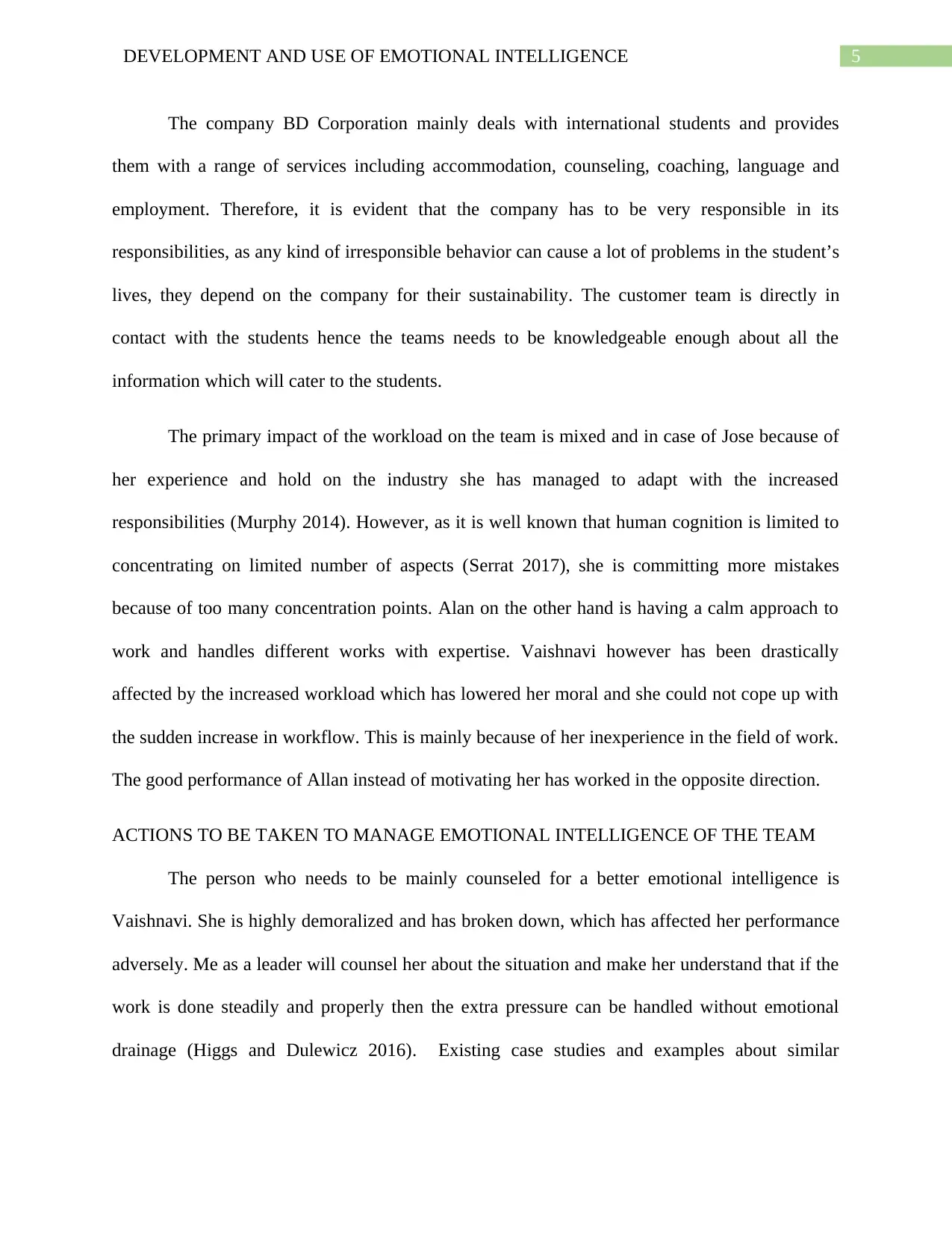
5DEVELOPMENT AND USE OF EMOTIONAL INTELLIGENCE
The company BD Corporation mainly deals with international students and provides
them with a range of services including accommodation, counseling, coaching, language and
employment. Therefore, it is evident that the company has to be very responsible in its
responsibilities, as any kind of irresponsible behavior can cause a lot of problems in the student’s
lives, they depend on the company for their sustainability. The customer team is directly in
contact with the students hence the teams needs to be knowledgeable enough about all the
information which will cater to the students.
The primary impact of the workload on the team is mixed and in case of Jose because of
her experience and hold on the industry she has managed to adapt with the increased
responsibilities (Murphy 2014). However, as it is well known that human cognition is limited to
concentrating on limited number of aspects (Serrat 2017), she is committing more mistakes
because of too many concentration points. Alan on the other hand is having a calm approach to
work and handles different works with expertise. Vaishnavi however has been drastically
affected by the increased workload which has lowered her moral and she could not cope up with
the sudden increase in workflow. This is mainly because of her inexperience in the field of work.
The good performance of Allan instead of motivating her has worked in the opposite direction.
ACTIONS TO BE TAKEN TO MANAGE EMOTIONAL INTELLIGENCE OF THE TEAM
The person who needs to be mainly counseled for a better emotional intelligence is
Vaishnavi. She is highly demoralized and has broken down, which has affected her performance
adversely. Me as a leader will counsel her about the situation and make her understand that if the
work is done steadily and properly then the extra pressure can be handled without emotional
drainage (Higgs and Dulewicz 2016). Existing case studies and examples about similar
The company BD Corporation mainly deals with international students and provides
them with a range of services including accommodation, counseling, coaching, language and
employment. Therefore, it is evident that the company has to be very responsible in its
responsibilities, as any kind of irresponsible behavior can cause a lot of problems in the student’s
lives, they depend on the company for their sustainability. The customer team is directly in
contact with the students hence the teams needs to be knowledgeable enough about all the
information which will cater to the students.
The primary impact of the workload on the team is mixed and in case of Jose because of
her experience and hold on the industry she has managed to adapt with the increased
responsibilities (Murphy 2014). However, as it is well known that human cognition is limited to
concentrating on limited number of aspects (Serrat 2017), she is committing more mistakes
because of too many concentration points. Alan on the other hand is having a calm approach to
work and handles different works with expertise. Vaishnavi however has been drastically
affected by the increased workload which has lowered her moral and she could not cope up with
the sudden increase in workflow. This is mainly because of her inexperience in the field of work.
The good performance of Allan instead of motivating her has worked in the opposite direction.
ACTIONS TO BE TAKEN TO MANAGE EMOTIONAL INTELLIGENCE OF THE TEAM
The person who needs to be mainly counseled for a better emotional intelligence is
Vaishnavi. She is highly demoralized and has broken down, which has affected her performance
adversely. Me as a leader will counsel her about the situation and make her understand that if the
work is done steadily and properly then the extra pressure can be handled without emotional
drainage (Higgs and Dulewicz 2016). Existing case studies and examples about similar
⊘ This is a preview!⊘
Do you want full access?
Subscribe today to unlock all pages.

Trusted by 1+ million students worldwide
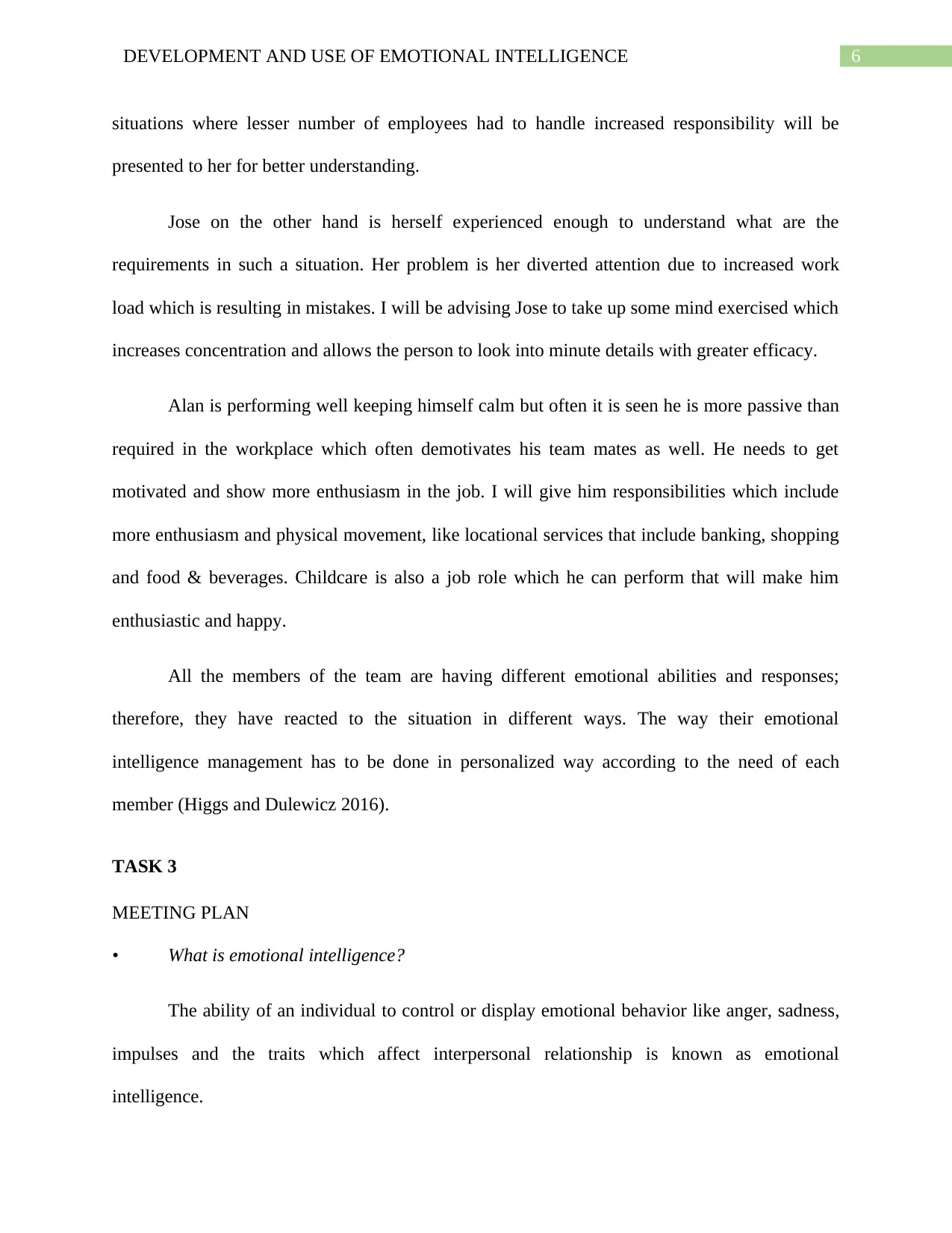
6DEVELOPMENT AND USE OF EMOTIONAL INTELLIGENCE
situations where lesser number of employees had to handle increased responsibility will be
presented to her for better understanding.
Jose on the other hand is herself experienced enough to understand what are the
requirements in such a situation. Her problem is her diverted attention due to increased work
load which is resulting in mistakes. I will be advising Jose to take up some mind exercised which
increases concentration and allows the person to look into minute details with greater efficacy.
Alan is performing well keeping himself calm but often it is seen he is more passive than
required in the workplace which often demotivates his team mates as well. He needs to get
motivated and show more enthusiasm in the job. I will give him responsibilities which include
more enthusiasm and physical movement, like locational services that include banking, shopping
and food & beverages. Childcare is also a job role which he can perform that will make him
enthusiastic and happy.
All the members of the team are having different emotional abilities and responses;
therefore, they have reacted to the situation in different ways. The way their emotional
intelligence management has to be done in personalized way according to the need of each
member (Higgs and Dulewicz 2016).
TASK 3
MEETING PLAN
• What is emotional intelligence?
The ability of an individual to control or display emotional behavior like anger, sadness,
impulses and the traits which affect interpersonal relationship is known as emotional
intelligence.
situations where lesser number of employees had to handle increased responsibility will be
presented to her for better understanding.
Jose on the other hand is herself experienced enough to understand what are the
requirements in such a situation. Her problem is her diverted attention due to increased work
load which is resulting in mistakes. I will be advising Jose to take up some mind exercised which
increases concentration and allows the person to look into minute details with greater efficacy.
Alan is performing well keeping himself calm but often it is seen he is more passive than
required in the workplace which often demotivates his team mates as well. He needs to get
motivated and show more enthusiasm in the job. I will give him responsibilities which include
more enthusiasm and physical movement, like locational services that include banking, shopping
and food & beverages. Childcare is also a job role which he can perform that will make him
enthusiastic and happy.
All the members of the team are having different emotional abilities and responses;
therefore, they have reacted to the situation in different ways. The way their emotional
intelligence management has to be done in personalized way according to the need of each
member (Higgs and Dulewicz 2016).
TASK 3
MEETING PLAN
• What is emotional intelligence?
The ability of an individual to control or display emotional behavior like anger, sadness,
impulses and the traits which affect interpersonal relationship is known as emotional
intelligence.
Paraphrase This Document
Need a fresh take? Get an instant paraphrase of this document with our AI Paraphraser
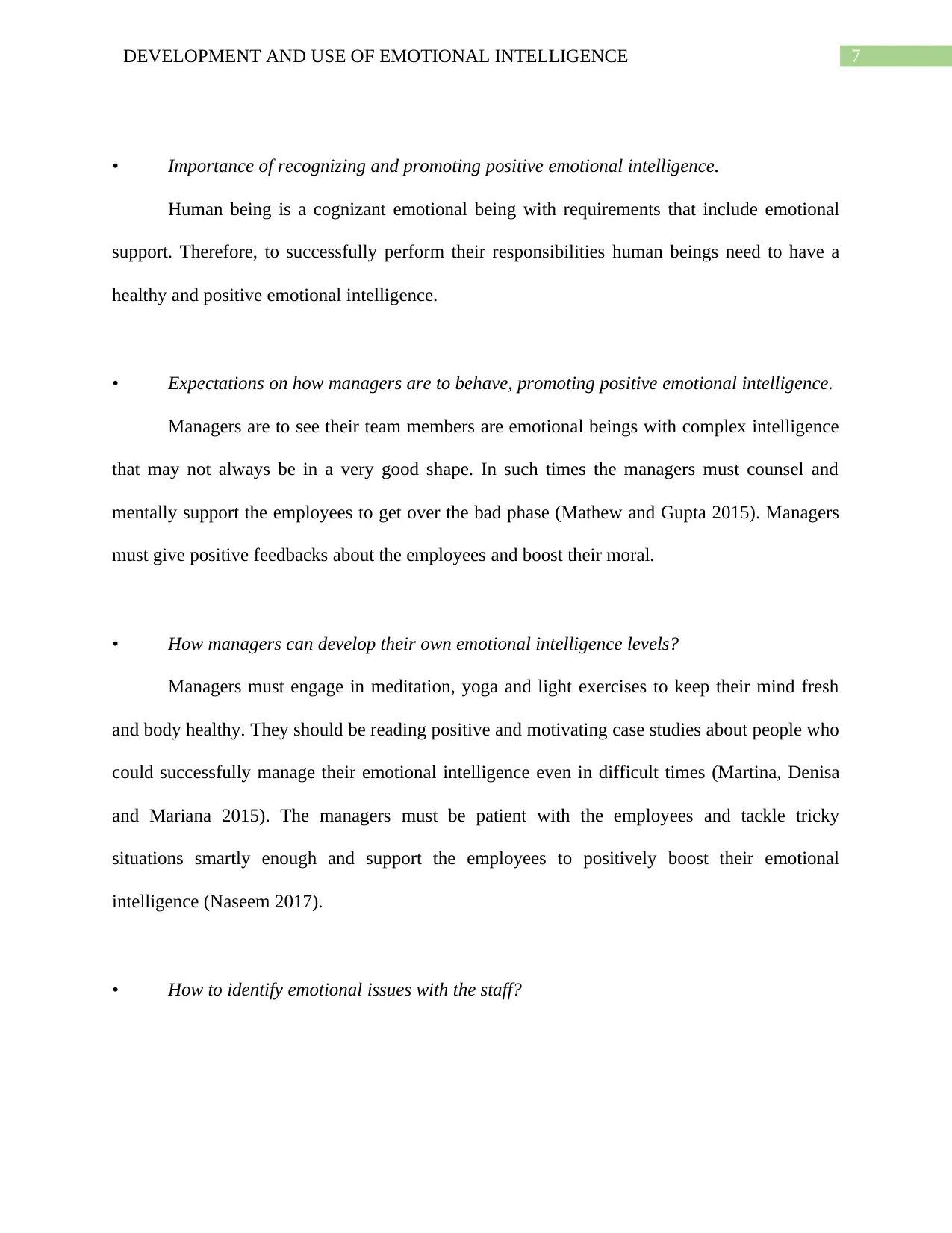
7DEVELOPMENT AND USE OF EMOTIONAL INTELLIGENCE
• Importance of recognizing and promoting positive emotional intelligence.
Human being is a cognizant emotional being with requirements that include emotional
support. Therefore, to successfully perform their responsibilities human beings need to have a
healthy and positive emotional intelligence.
• Expectations on how managers are to behave, promoting positive emotional intelligence.
Managers are to see their team members are emotional beings with complex intelligence
that may not always be in a very good shape. In such times the managers must counsel and
mentally support the employees to get over the bad phase (Mathew and Gupta 2015). Managers
must give positive feedbacks about the employees and boost their moral.
• How managers can develop their own emotional intelligence levels?
Managers must engage in meditation, yoga and light exercises to keep their mind fresh
and body healthy. They should be reading positive and motivating case studies about people who
could successfully manage their emotional intelligence even in difficult times (Martina, Denisa
and Mariana 2015). The managers must be patient with the employees and tackle tricky
situations smartly enough and support the employees to positively boost their emotional
intelligence (Naseem 2017).
• How to identify emotional issues with the staff?
• Importance of recognizing and promoting positive emotional intelligence.
Human being is a cognizant emotional being with requirements that include emotional
support. Therefore, to successfully perform their responsibilities human beings need to have a
healthy and positive emotional intelligence.
• Expectations on how managers are to behave, promoting positive emotional intelligence.
Managers are to see their team members are emotional beings with complex intelligence
that may not always be in a very good shape. In such times the managers must counsel and
mentally support the employees to get over the bad phase (Mathew and Gupta 2015). Managers
must give positive feedbacks about the employees and boost their moral.
• How managers can develop their own emotional intelligence levels?
Managers must engage in meditation, yoga and light exercises to keep their mind fresh
and body healthy. They should be reading positive and motivating case studies about people who
could successfully manage their emotional intelligence even in difficult times (Martina, Denisa
and Mariana 2015). The managers must be patient with the employees and tackle tricky
situations smartly enough and support the employees to positively boost their emotional
intelligence (Naseem 2017).
• How to identify emotional issues with the staff?
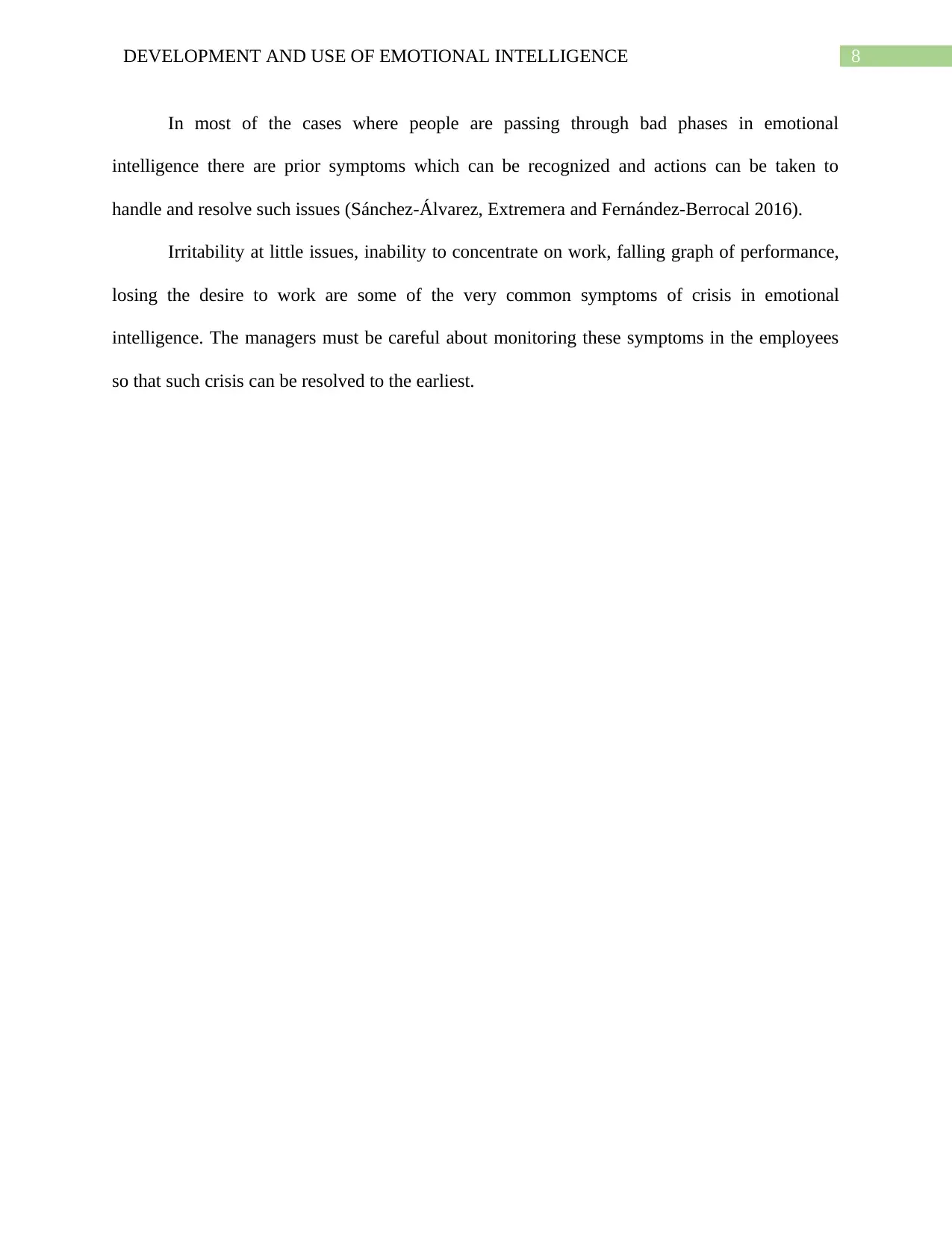
8DEVELOPMENT AND USE OF EMOTIONAL INTELLIGENCE
In most of the cases where people are passing through bad phases in emotional
intelligence there are prior symptoms which can be recognized and actions can be taken to
handle and resolve such issues (Sánchez-Álvarez, Extremera and Fernández-Berrocal 2016).
Irritability at little issues, inability to concentrate on work, falling graph of performance,
losing the desire to work are some of the very common symptoms of crisis in emotional
intelligence. The managers must be careful about monitoring these symptoms in the employees
so that such crisis can be resolved to the earliest.
In most of the cases where people are passing through bad phases in emotional
intelligence there are prior symptoms which can be recognized and actions can be taken to
handle and resolve such issues (Sánchez-Álvarez, Extremera and Fernández-Berrocal 2016).
Irritability at little issues, inability to concentrate on work, falling graph of performance,
losing the desire to work are some of the very common symptoms of crisis in emotional
intelligence. The managers must be careful about monitoring these symptoms in the employees
so that such crisis can be resolved to the earliest.
⊘ This is a preview!⊘
Do you want full access?
Subscribe today to unlock all pages.

Trusted by 1+ million students worldwide
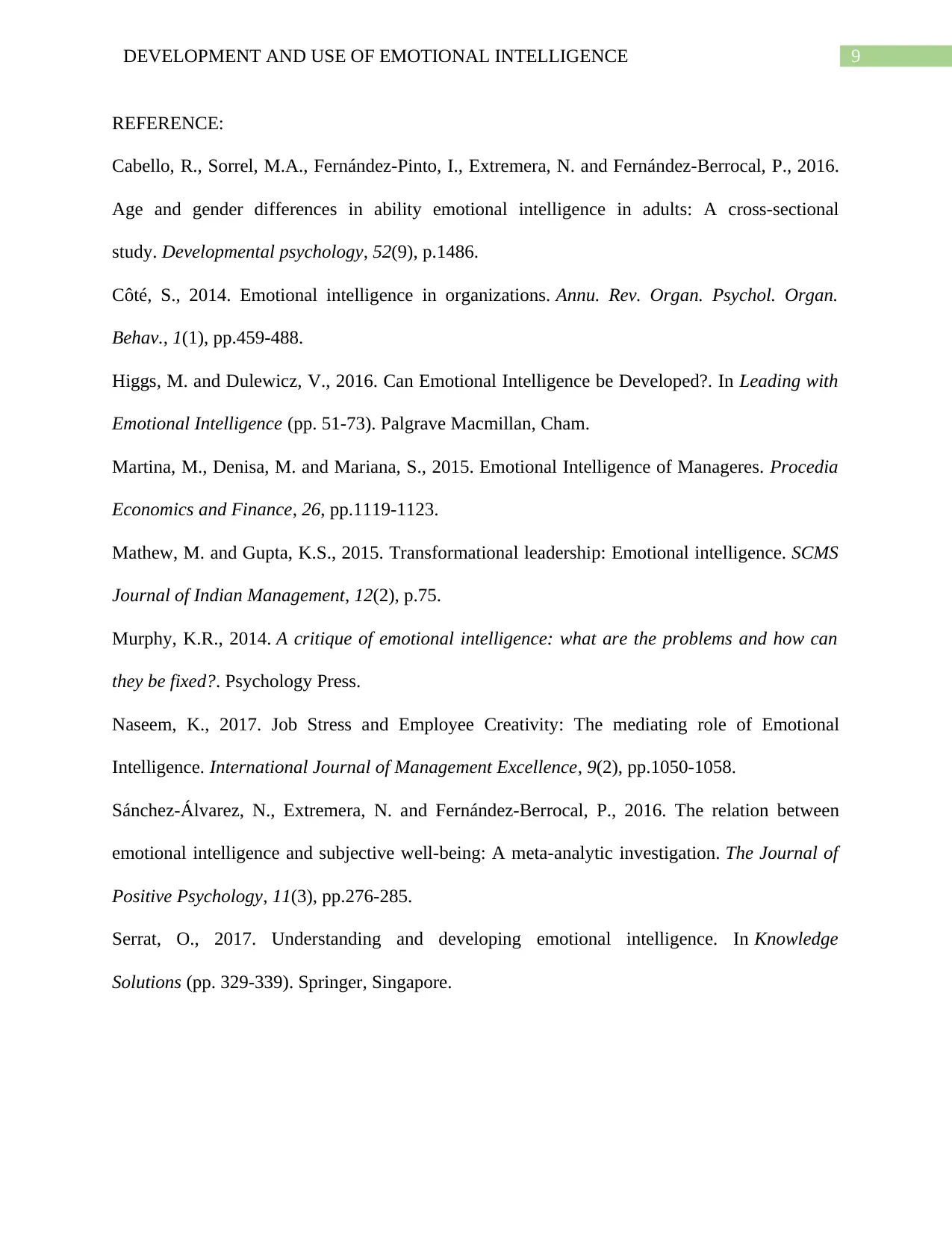
9DEVELOPMENT AND USE OF EMOTIONAL INTELLIGENCE
REFERENCE:
Cabello, R., Sorrel, M.A., Fernández-Pinto, I., Extremera, N. and Fernández-Berrocal, P., 2016.
Age and gender differences in ability emotional intelligence in adults: A cross-sectional
study. Developmental psychology, 52(9), p.1486.
Côté, S., 2014. Emotional intelligence in organizations. Annu. Rev. Organ. Psychol. Organ.
Behav., 1(1), pp.459-488.
Higgs, M. and Dulewicz, V., 2016. Can Emotional Intelligence be Developed?. In Leading with
Emotional Intelligence (pp. 51-73). Palgrave Macmillan, Cham.
Martina, M., Denisa, M. and Mariana, S., 2015. Emotional Intelligence of Manageres. Procedia
Economics and Finance, 26, pp.1119-1123.
Mathew, M. and Gupta, K.S., 2015. Transformational leadership: Emotional intelligence. SCMS
Journal of Indian Management, 12(2), p.75.
Murphy, K.R., 2014. A critique of emotional intelligence: what are the problems and how can
they be fixed?. Psychology Press.
Naseem, K., 2017. Job Stress and Employee Creativity: The mediating role of Emotional
Intelligence. International Journal of Management Excellence, 9(2), pp.1050-1058.
Sánchez-Álvarez, N., Extremera, N. and Fernández-Berrocal, P., 2016. The relation between
emotional intelligence and subjective well-being: A meta-analytic investigation. The Journal of
Positive Psychology, 11(3), pp.276-285.
Serrat, O., 2017. Understanding and developing emotional intelligence. In Knowledge
Solutions (pp. 329-339). Springer, Singapore.
REFERENCE:
Cabello, R., Sorrel, M.A., Fernández-Pinto, I., Extremera, N. and Fernández-Berrocal, P., 2016.
Age and gender differences in ability emotional intelligence in adults: A cross-sectional
study. Developmental psychology, 52(9), p.1486.
Côté, S., 2014. Emotional intelligence in organizations. Annu. Rev. Organ. Psychol. Organ.
Behav., 1(1), pp.459-488.
Higgs, M. and Dulewicz, V., 2016. Can Emotional Intelligence be Developed?. In Leading with
Emotional Intelligence (pp. 51-73). Palgrave Macmillan, Cham.
Martina, M., Denisa, M. and Mariana, S., 2015. Emotional Intelligence of Manageres. Procedia
Economics and Finance, 26, pp.1119-1123.
Mathew, M. and Gupta, K.S., 2015. Transformational leadership: Emotional intelligence. SCMS
Journal of Indian Management, 12(2), p.75.
Murphy, K.R., 2014. A critique of emotional intelligence: what are the problems and how can
they be fixed?. Psychology Press.
Naseem, K., 2017. Job Stress and Employee Creativity: The mediating role of Emotional
Intelligence. International Journal of Management Excellence, 9(2), pp.1050-1058.
Sánchez-Álvarez, N., Extremera, N. and Fernández-Berrocal, P., 2016. The relation between
emotional intelligence and subjective well-being: A meta-analytic investigation. The Journal of
Positive Psychology, 11(3), pp.276-285.
Serrat, O., 2017. Understanding and developing emotional intelligence. In Knowledge
Solutions (pp. 329-339). Springer, Singapore.
1 out of 10
Related Documents
Your All-in-One AI-Powered Toolkit for Academic Success.
+13062052269
info@desklib.com
Available 24*7 on WhatsApp / Email
![[object Object]](/_next/static/media/star-bottom.7253800d.svg)
Unlock your academic potential
Copyright © 2020–2026 A2Z Services. All Rights Reserved. Developed and managed by ZUCOL.





